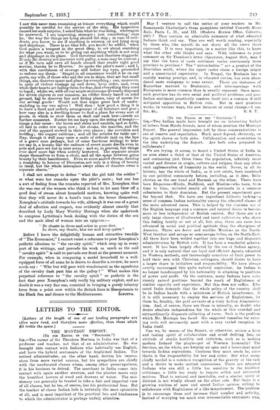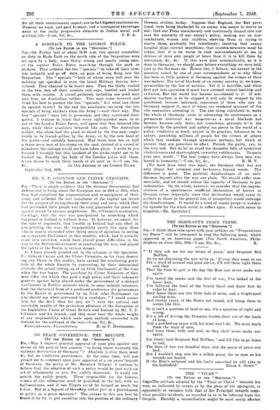[To THE EDITOR OF THE " SPECTATOR...] SIE,—Two Indian mails
have brought me an interesting budget of letters from Hindu friends, most of whom mention the Montagu Report. The general impression left by these communications is one of reserve and expectation. Much must depend, obviously, on the spirit shown on both sides. Collaboration and association is the idea underlying the Report. Are both sides prepared to collaborate P We are trying, it seems, to found a United States of India in an area about a third of that of the United States of America, and containing just three times the population, infinitely more varied and diverse in origin, culture and religion than any other such agglomeration of humanity in the world. Never, in all its history, has the whole of India, as it now exists, been combined in one political community before, including, as it does, Balu- chistan on the one hand and Burmah on the other. There have been Emperors—Hindu, Buddhist, and Muslim—who have, from time to time, included nearly all the peninsula in a common submission to their dominion. But the present experiment goes far beyond that. We have one ingredient hitherto lacking—a sense of common Indian nationality among the educated classes of the more advanced races. This is helped by the common use of the English language and a common and natural desire to become more or less independent of British control. But there are not only large classes of ill-educated and inert cultivators who share this feeling faintly or not at all, but, also, there are races less advanced in social and political aptitude than the aborigines of America. There are fierce and warlike Muslims on the North- West frontier and savage or semi-savage tribes on the North-East. All these have been welded together into one huge and disparate administration by British rule. It has been a wonderful achieve- ment. It has been largely effected by the use of Indian agency, and it is only natural that our loyal and efficient Agents, educated in Western methods, and increasingly conscious of their power to hold their own with Christian colleagues, should desire to have a larger share in initiative and responsibility. We have always overtly encouraged this quite natural aspiration. An Indian is no longer handicapped by his nationality in attaining to positions of power and profit. On the contrary, many Indians have noto- riously gained positions beyond the reach of Englishmen of similar capacity and experience. But this does not suffice. Edu- cated India demands that the whole policy of the country shall be in Indian hands with a minimum of British interference. If it is still necessary to employ the services of Englishmen, let them be, frankly, the paid servants of a truly Indian Administra- tion. And, of course, there are those (a minority, no doubt) who desire absolute independence for the whole of this crowded and extraordinarily disparate collection of races. Such is the problem which Mr. Montagu has faced. His suggested remedies for exist- ing evils will necessarily meet with a very varied reception in India itself.
Can we, by means of the Report, or otherwise, arouse a keen and lasting spirit of collaboration and avoid drifting into an attitude of sterile hostility and criticism, such as is making modern Ireland the plague-spot of Western humanity? The Services, on the whole, are keeping an open and a benevolent mind towards Indian aspirations. Cautious they must needs be, since theirs is the responsibility for law and order. But what seems chiefly needed is a common recognition of the gravity of the task and a desire to make mutual concessions. There are educated Indians who are still a little too sensitive to the kindliest criticisms, a little too ready to impute selfish and interested motives. That is natural and inevitable, and a similar spirit of distrust is not wholly absent on the other side. But there is a growing nucleus of sane and sound Indian opinion willing to collaborate with Englishmen of a like temperament. The problem is to encourage these and increase their number and activity, Instead of worrying too much over irreconcilable extremists who, for all their revolutionary aspect, are in fact bigoted reactionaries. Humour we want, and good humour, and a courageous encourage- ment of the really progressive elements in Indian social and



























 Previous page
Previous page